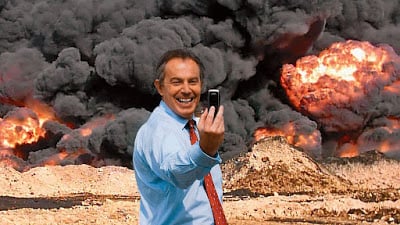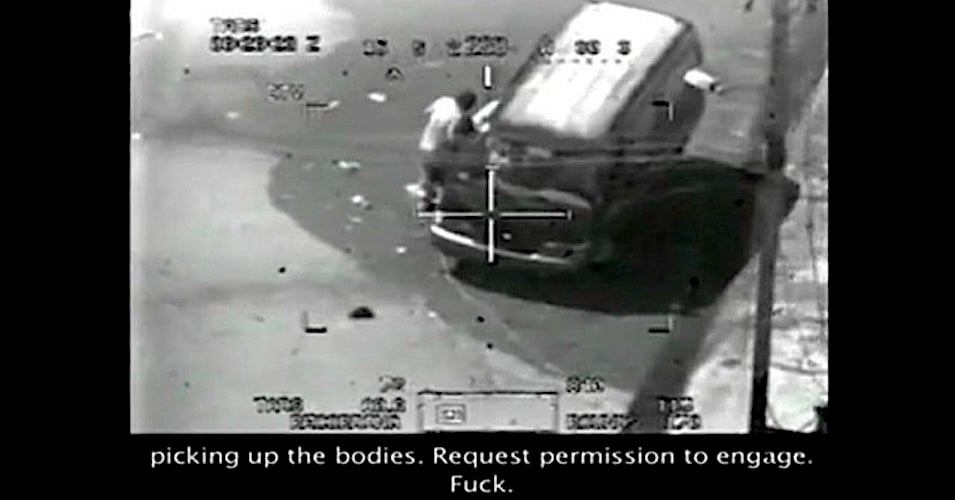19 Years Ago, Invasion of Iraq: The War that Never Happened
Today is the 19th anniversary of the US invasion of Iraq. It was a catastrophic, illegal, murderous war — and Joe Biden was one its most important cheerleaders.

All Global Research articles can be read in 51 languages by activating the “Translate Website” drop down menu on the top banner of our home page (Desktop version).
To receive Global Research’s Daily Newsletter (selected articles), click here.
Visit and follow us on Instagram at @globalresearch_crg and Twitter at @crglobalization. Feel free to repost and share widely Global Research articles.
***
On the campaign trail in 2020, Joe Biden was barely probed about his long-standing support for the Iraq War, a fact he attempted to conceal. According to Biden (who repeatedly touted his experience in foreign policy in the lead-up to the presidential election), he had opposed the war from the very beginning — the “very moment” the first bombs came roaring down on Baghdad.
Not only did Biden cast a critical vote to authorize military force; he also played a crucial role in creating the case for war in the first place. As chairman of the Senate Foreign Relations Committee, Biden built support for a bipartisan resolution that ultimately gave George W. Bush’s administration wide discretion to defend the United States from any perceived threat from Iraq. In the years since, Biden has argued that he only voted for the 2002 Authorization for Use of Military Force Against Iraq to enhance the United States’ bargaining power at the United Nations — as if putting a gun to the head of the international community (what Biden called “tough diplomacy”) represented anything other than a call for war.
Far from the reluctant warrior he’s portrayed himself as, Biden — by rejecting alternative resolutions that would have required the United States to predicate military action on authorization from the United Nations Security Council, and disparaging more progressive Democrats who balked at the prospect of war as purists — ultimately created the very conditions in which opposition to war became untenable in the first place.
In fact, Biden had called for war with Iraq for years. In 1998, he warned that the country represented a grave threat to US interests. According to Biden, it was impossible for inspectors to guarantee that Hussein would not develop WMDs in the future (if he didn’t have them already), and that “the only way . . . to get rid of [him]” was to put boots on the ground — sooner or later.
But the rationale that Biden had so diligently crafted for years — that Iraq posed an existential threat to the United States — never materialized. A desperate search for WMDs in the wake of the invasion produced nothing. Within a year, a majority of Americans realized that the invasion had been a mistake. And by the end of 2014, lawmakers and the intelligence community alike conceded that not only did Iraq have no such weapons — biological, chemical, or nuclear — but prewar intelligence had been deeply flawed.
And yet not even during the heated final debate of the primaries in 2020 did Bernie Sanders (who had voted against the invasion in 2002 as a representative of Vermont) make the case — which he had alluded to on the campaign trail more than once — that Biden was unfit to serve as president because of what was, in Sanders’s view, “the worst foreign policy blunder in the modern history of the United States.”
Elizabeth Warren, another candidate who had called the Iraq War a mistake, also failed to challenge Biden’s historical defense of the invasion — from denying that he had ever believed Hussein possessed WMDs to lamenting that the only mistake he had made was to trust the Bush administration. When asked whether Biden was to blame, Warren — a legal academic who had begun her political career taking on the president over the 2005 bankruptcy bill — demurred.
In fact, the most strenuous criticism against Biden’s role in the Iraq War was leveled in March 2020 by an air force veteran who accused Biden of having the blood of fellow service members on his hands. But despite his overtures that he had come to regret his support for the war — which became increasingly unpopular in the upper echelons of the Democratic Party in subsequent years — Biden never learned from his mistake.
Eleven years after the intervention in Libya’s civil war and twenty thousand deaths later, it’s clear the United States’ seven-month bombing campaign not only suffered from poor planning, no exit strategy, and flawed intelligence — the same faults Biden attributed to the Iraq War — but also had nothing to do with protecting civilians in the first place. Despite Barack Obama’s initial declaration that regime change was out of the question, Biden would come to praise NATO for removing the Libyan dictator Muammar Qaddafi. Biden’s revelation, years later, that he had opposed the intervention from the beginning again shows how he continues to deny responsibility for the United States’ repeated misadventures in the Middle East — all on his watch.
“The Original Sin of the Twenty-First Century”
Within a few years, studies concluded that over a million Iraqis had lost their lives, and, since the fifteenth anniversary of what the scholar Tallha Abdulrazaq calls “the original sin of the 21st century,” it’s estimated that the corpses of 2.4 million people litter the very cradle of civilization. In addition to leading to widespread death and destruction, destabilizing the region, and giving rise to the Islamic State, the war has also had more distant (albeit foreseeable) long-term effects, such as the global refugee crisis and the rise of right-wing governments on both sides of the Atlantic.
American voters used to give a damn about the Iraq War. In 2008, Barack Obama leveraged widespread discontent with the war to secure the Democratic nomination, courting progressives and young people alike. In fact, it’s widely believed that Hillary Clinton lost to the senator from Illinois not just because she had voted for the war — and was instrumental in rallying ambivalent Democrats to the cause — but because Obama had decried the invasion from the start.
In later years, vast swaths of the American public became convinced that the war was a disaster. Bush’s approval rating dropped to an all-time low of 25 percent, based in large part on the widespread belief that the occupation was a mess. By 2016, even Republicans like Donald Trump, who had run on a nihilistic platform of killing the families of purported terrorists and “bringing torture back,” would come to attack Clinton’s lack of foresight from the left.
Obama’s obvious contempt for his predecessor’s war, based on a haphazard and incoherent policy in Iraq, was soon overshadowed by what can only be described as his neglect. Under his leadership, US forces withdrew in 2011, only to return a few years later with a seemingly never-ending mandate to fight ISIS — a creation of the occupation itself that the president not only gravely underestimated as al-Qaeda’s “JV team” but subsequently emboldened, spending billions of dollars more than Bush ever had in the process.
Despite inveighing at length against the Iraq War — calling it a “big fat mistake” — Trump would also come to authorize further troop surges and bombing raids. In July 2017, Trump joined Iraqi prime minister Haider al-Abadi in declaring Mosul free from ISIS control after Iraqi and US forces completely destroyed the city in some of the most horrific violence since the invasion — based in no small part on the fact that Trump had removed restrictions on US military operations designed to reduce civilian casualties. Only in the dying embers of his first and final term did Trump decide to reduce troop levels in Iraq — by a pittance.
By the time the Iraqi people made their first forays into democracy in decades, the war had already faded from the American imagination. Following ISIS’s expulsion from Iraq in December 2017, massive demonstrations rocked the country again and again, with everyday people taking to the streets to protest high unemployment, widespread government corruption, and a lack of basic services like water and electricity. In 2019, Iraqis even burned down the Iranian consulate in the holy city of Najaf and forced the prime minister to resign — a powerful rebuke of an unpopular government that had killed hundreds of protestors.
But the convulsions in Iraq were barely reported in the United States. Media coverage of the war has fallen precipitously for years; even when it is in the news, it’s on the periphery. Trump’s assassination of Iranian general Qassem Soleimani in January 2020 drew censure from Democrats who condemned his failure to obtain congressional authorization for what was called an act of war. But the fact that the strike had taken place at the Baghdad airport, or that Iraqi authorities hadn’t been consulted in advance, wasn’t questioned at all.
The Iraq War made headlines again when, in a desperate response to his electoral loss, Trump declared that all troops in the country would be home by January 2021. But despite Biden’s belated decision to bring the nearly twenty-year conflict to an ignoble end (met with a combination of faux outrage, sentimental nostalgia, and legitimate concern), it’s unclear whether his announcement last December that the United States had concluded the combat mission in Iraq for the umpteenth time amounted to anything more than a verbal sleight of hand.
“The Supreme International Crime”
“Photo Op”. Credit: Imperial War Museum/Peter Kennard & Cat Philips (2005)
Before famously changing his mind, UK attorney general Peter Goldsmith advised Tony Blair on the eve of the invasion that the prime minister would be susceptible to prosecution in UK court for the “crime of aggression” — or what the Allies called “crimes against peace” — an offense established after World War II precisely to impose individual criminal liability on Axis leaders for the sin of having gone to war in the first place. According to the Nuremberg court, the crime of aggression “is the supreme international crime differing only from other war crimes in that it contains within itself the accumulated evil of the whole.”
On the other side of the pond, Iraqi general Abdul-Wahid Shannan Al-Rabat brought a private prosecution against Blair, Goldsmith, and former foreign secretary Jack Straw in 2016 for the crime of aggression as well, based on the results of a yearslong investigation into the UK’s role in the Iraq War. The High Court subsequently dismissed the case.
For senior members of the Democratic Party, the crimes of the Bush era were largely inconsequential. Despite repeated calls for impeachment among leading Democrats at the time, House Leader Nancy Pelosi made it clear that it was “off the table,” even after the party gained control of Congress in 2006. Years later, she revealed that she knew Bush was lying through his teeth the whole time, and that the Iraq War was a sham — but that, in her view, it didn’t rise to an impeachable offense. Obama echoed this in his latest memoir, in which he praises his predecessor and chastises Americans who condemned Bush as a war criminal.
Republicans have strenuously defended Bush’s legacy as well. In November 2020, in a rare act of defiance, several prominent members of the party condemned Trump’s plans to reduce troop levels in Afghanistan and Iraq. Trump himself granted clemency to US soldiers and contractors for some of the most heinous crimes committed on Iraqi soil, including the infamous massacre of seventeen Iraqis in 2007 by Blackwater mercenaries. And among his own party, Bush remains as popular as ever. As of 2018, his approval rating among Republicans hadn’t dropped below 75 percent in ten years.
The fact that not a single official has been held accountable for the decision to invade Iraq is emblematic of the “war on terror” in general. Whether it’s Abu Ghraib, torture, extraordinary rendition, black sites, secret surveillance, drone strikes, or Guantanamo, the United States has consistently denied responsibility for the crimes of the Bush administration and beyond. Perpetrators like former secretary of state Colin Powell and secretary of defense Donald Rumsfeld have also escaped justice altogether — in death. Even US allies have taken more responsibility for their respective roles. In recent years, Canada has compensated former detainees at Guantanamo, Italy has convicted CIA agents for torture in absentia, and Australia has concluded a probe into war crimes committed by special forces in Afghanistan.
Screenshot from Collateral Murder video released by WikiLeaks.
In contrast, investigations by the United States have probed only the extent to which the Iraq War represented a massive intelligence failure, precisely to avoid implicating the political leadership involved. The Chilcot report, released in 2016, not only laid bare the baseless and confused rationale for the war but placed the blame squarely on Blair’s government. And since taking office, Biden — just like his predecessor — has doggedly pursued whistleblowers like Julian Assange for the audacity of exposing, among other things, US forces murdering Iraqi civilians for sport.
The Forever Wars
Whether it’s proxy wars with neighboring countries or ongoing drone warfare in the region, the US continues to wage forever war against an inchoate enemy — with Iraq as base of operations. There is no indication that Biden intends to deliver any semblance of justice to the Iraqi people either. All eyes are on whether Congress’s decision to finally rescind the 2002 Authorization for Use of Military Force will bring an end to the carnage once and for all — or merely update it for yet another phase of US interventionism.
*
Note to readers: Please click the share buttons above or below. Follow us on Instagram, @globalresearch_crg and Twitter at @crglobalization. Feel free to repost and share widely Global Research articles.
Saif Ansari is a practicing attorney.



